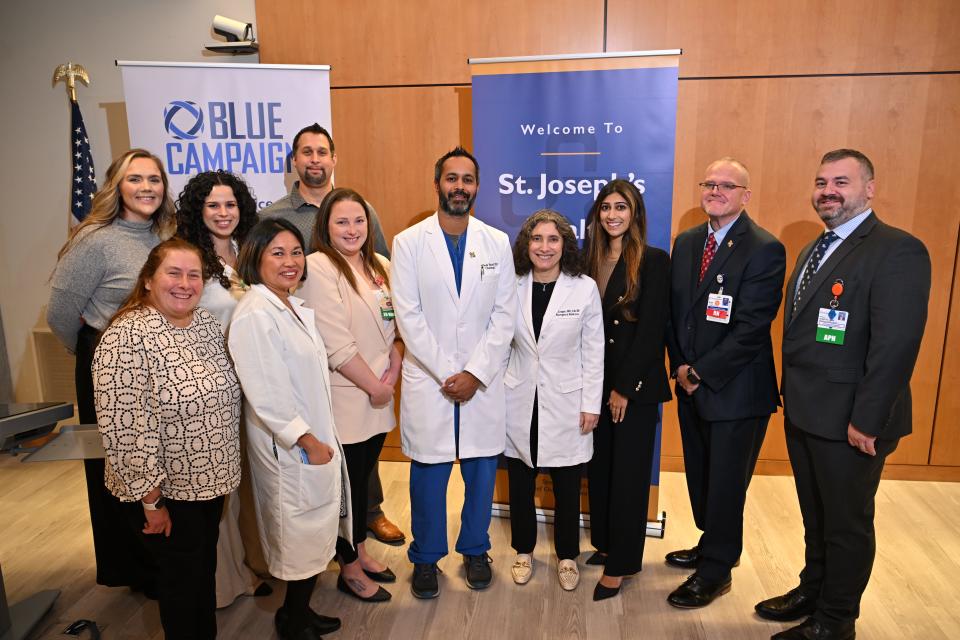This is why St. Joseph’s is trying to identify human trafficking victims who come to ERs
PATERSON — As a teenager, Gina Cavallo ran away from home to escape abuse. At age 18, she fell into the hands of a prostitution ring, where she spent two years, carted across state lines as a “commodity,” she said.
“I was doing fine,” Cavallo said, “until I met some nice people who pretended to be my friends and they took me into a life I was unable to get out of.”
Cavallo, who was born in Hawthorne, shared her story at St. Joseph’s University Medical Center on Wednesday as hospital officials announced the launch of an outreach program designed to identify victims of trafficking who come through their doors.
What will the initiative do?

As part of the initiative, St. Joseph’s will be training all 400 emergency room workers at its Paterson and Wayne hospitals in ways to spot trafficking victims. The program also will include a variety of clandestine means to reach out to trafficking victims who use the emergency rooms, efforts that hospital officials don’t want to reveal lest the abusers find out about them.
“Health care providers are our first responders and have the unique opportunity to recognize signs of trafficking,” said Chris Musto, director of investigations at the U.S. Department of Homeland Security. “But without proper awareness and training, these opportunities could be lost.”
Victims of trafficking often suffer from serious health issues, such as illnesses, pregnancy, addiction and overdose, that bring them to emergency rooms, Musto said.
“Many of our patients are the victims of human trafficking and yet it’s an underrecognized problem,” said Nilesh Patel, chairman of emergency medicine at St. Joseph’s. “Sadly, some data show that some clinicians don’t feel prepared or educated to recognize and assist human trafficking victims.”
Officials said St. Joseph’s is the first hospital in New Jersey partnering with Blue Campaign, an arm of the Department of Homeland Security's Washington-based Center for Countering Human Trafficking.
Erin Corcoran, a special agent with Homeland Security Investigations, said many victims, like Cavallo, become ensnared in trafficking operations without ever crossing an international border.
“You can become a victim without even leaving your hometown,” Corcoran said.
‘Stay alert’: Paterson cop talks about gun arrest on domestic violence call
What is the scale of trafficking in New Jersey?
The nation has seen an uptick in trafficking as a result of the pandemic, said Brandi Bynum, Blue Campaign’s senior coordinator.
“Traffickers prey on vulnerable individuals,” Bynum said. “When you think about vulnerability, you have to think about food, shelter and medical care. Traffickers often provide those things in exchange for something of value.”
In 2021, 16,554 individual victims of trafficking in the United States were reported by the Polaris Project, with New York, Newark and Jersey City considered major epicenters. North Jersey’s density and proximity to three major airports make it a hotbed, Corcoran said. “The likelihood of people who are going to be victimized increases,” she said.
The Polaris Project reported that 88% of trafficking victims come in contact with health care services
“The idea is to make this a safe haven,” Brian Dolan said of the St. Joseph's ERs. “Even if they’re not ready today, they know they can come back and be safe and we’ll be able to connect them to what they need.”
Cavallo eventually fled her abductors, after earning their trust through years of compliance. “I escaped that life in Vegas,” Cavallo said. “That’s when I had an opportunity to escape and went back home.”
However, she noted that due to the psychological manipulation used by traffickers, victims also are unable to self-report during their first visit to a hospital, either because they don’t understand what is happening to them or because they fear retaliation. In fact, Cavallo said there was a time when she blamed herself for her own predicament.
“Sleep-deprivation, threats of violence, pornography, drugs and food were all used as punishment and reward, leading to my traffickers taking psychological control of me,” Cavallo told a House foreign affairs subcommittee at the Capitol in May. “Because of the complex nature of this crime, traffickers frequently operate under the radar, and those being trafficked don’t always identify as victims.”
Cavallo, who now works for the New Jersey Coalition Against Human Trafficking, agreed with Dolan that victims may not come forward with medical professionals at first.
“But they’ll remember you,” Cavallo said. “They’ll come back."
Darren Tobia is a contributing writer for Paterson Press.
This article originally appeared on NorthJersey.com: St. Joseph's Health in NJ starts human trafficking initiative

